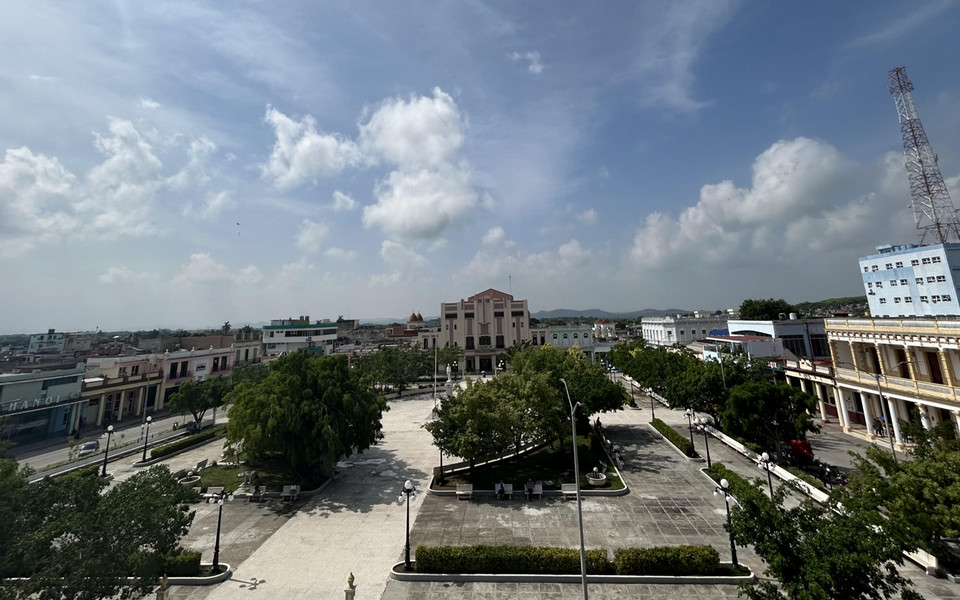Managing Everyday Life and Adaptability in Holguin, Cuba: Perspectives from My Ninety-Day Internship Experience

Photo of Carlixto Garcia Park, Holguin. Taken by the author.
Francisco Mendina
HIS PhD candidate, MMASc, HBSc.
October 07, 2024
I am writing this blog from the comfort of a rental house that has become my temporary home, located in the heart of Holguin, Cuba, just two blocks away from the busy Carlixto Garcia Park. I had the privilege of working with the University of Holguin and CITMA, the province's Centre for Research, Technology, and Environmental Sciences, during a ninety-day internship this summer. The focus of our internship is learning how to create communities that are resilient to natural disasters—a topic that is especially important in a nation that frequently faces such difficulties.
Despite not being directly related to my PhD research on humanitarian efforts and solidarity understandings and practices, this internship offers a unique learning opportunity for my professional development in the field of global health. While learning about CITMA's operations has been fascinating, comprehending the day-to-day realities of Cuban life is what really makes this experience unique.
Fuel and electricity shortages are at an all-time high in Cuba. As my Cuban professors and friends have told me, Holguin gets a lot of its energy from antiquated thermoelectric plants. Constructed in the 1970s and 1980s using Soviet, Czech, and other foreign technologies, Holguín's thermoelectric plants have long outlived their intended 30- to 35-year lifespan. Parts availability is hampered by the U.S. trade embargo, and these antiquated, oil-dependent facilities are further burdened by acute fuel shortages. Critical maintenance is consequently frequently put off, which exacerbates the cycle of outages and causes frequent breakdowns and power shortages. Throughout the entire day, electricity is rationed every six hours.
I made friends with a local man on one of my walks through the city, and he gave me a glimpse into his life in these circumstances. He described how, in the absence of electricity at night, he frequently must decide whether to have his daughter skip school the next day. Sleeping is nearly impossible during the summer months due to the extreme heat and the absence of fans or air conditioners caused by the lack of electricity. For children and the elderly, this lack of sleep combined with the ongoing fear of mosquito-borne diseases like Dengue generates a difficult environment. Families have a brief window of time during morning power outages to prepare meals. Therefore, you might be tempted to keep your child at home if they have trouble falling asleep at night.
Even though you could use a gas stove to cook in the absence of electricity, cooking in the dark is still very difficult, particularly in houses without natural light like mine. Additionally, there still is another obstacle to overcome: obtaining cooking gas.
In Holguin, gas tanks need to be refilled roughly every two months, but it's a challenging task. A month ago, a professor here told us about his experience of trying to fill up his propane tank with gas. He had to forego a week of classes to get in line every day at dawn and wait for more than five hours before going home empty-handed. Throughout the province, there is a general struggle because demand is far higher than supply.
These shortages have a significant indirect effect on basic services like healthcare. A friend of mine who works as a psychiatrist at the main medical facility in Holguin, the Lenin Hospital, explained how these problems even interfere with the lives of medical professionals. They too juggle their roles as healthcare providers and family caregivers, frequently skipping hospital workdays to provide for their families' needs, such as lining up for gas. Their already difficult jobs are made much more stressful by this ongoing juggling act, leaving hospitals understaffed.
Even though I have personally experienced food shortages, power outages, and other everyday difficulties, I am aware that privilege has cushioned my experience. I will be heading back to Canada in a few weeks, where I will live in a cool house with easy access to food and services, and I can order every need delivered to my front door. Additionally, the funds made available to me through the Queen Elizabeth Scholarship that funds my internship make enduring difficulties here easier. This striking contrast has made me more appreciative of the comforts I frequently take for granted and more conscious of the ongoing injustices.
I cannot help but feel uneasy knowing that my Cuban friends will continue to face these challenges on a daily basis while I go back to comfort. Though words cannot fully express the breadth of their daily struggles, I hope to share a glimpse of their reality through this blog.
The human potential and resiliency that I have seen in Holguin during these hardships are incredibly inspiring. Almost everyone I have met is a university graduate, and I find it fascinating that scientific research continues to flourish in Holguin despite structural challenges.
I want to honor the fortitude and resourcefulness of the people of Holguin by sharing this little glimpse into their way of life. Their resilience in the face of insurmountable adversity is a credit to their spirit, and I will carry this lesson with me long after I depart from Cuba.
I am incredibly appreciative of the connections I have made and the lessons I have learned as my time here comes to an end. This experience has broadened my professional horizons and improved my comprehension of the intricate relationships that exist between privilege, systemic challenges, and resilience. I have learned from the people of Holguin that extraordinary things can come from hope and determination, even in the face of adversity.
